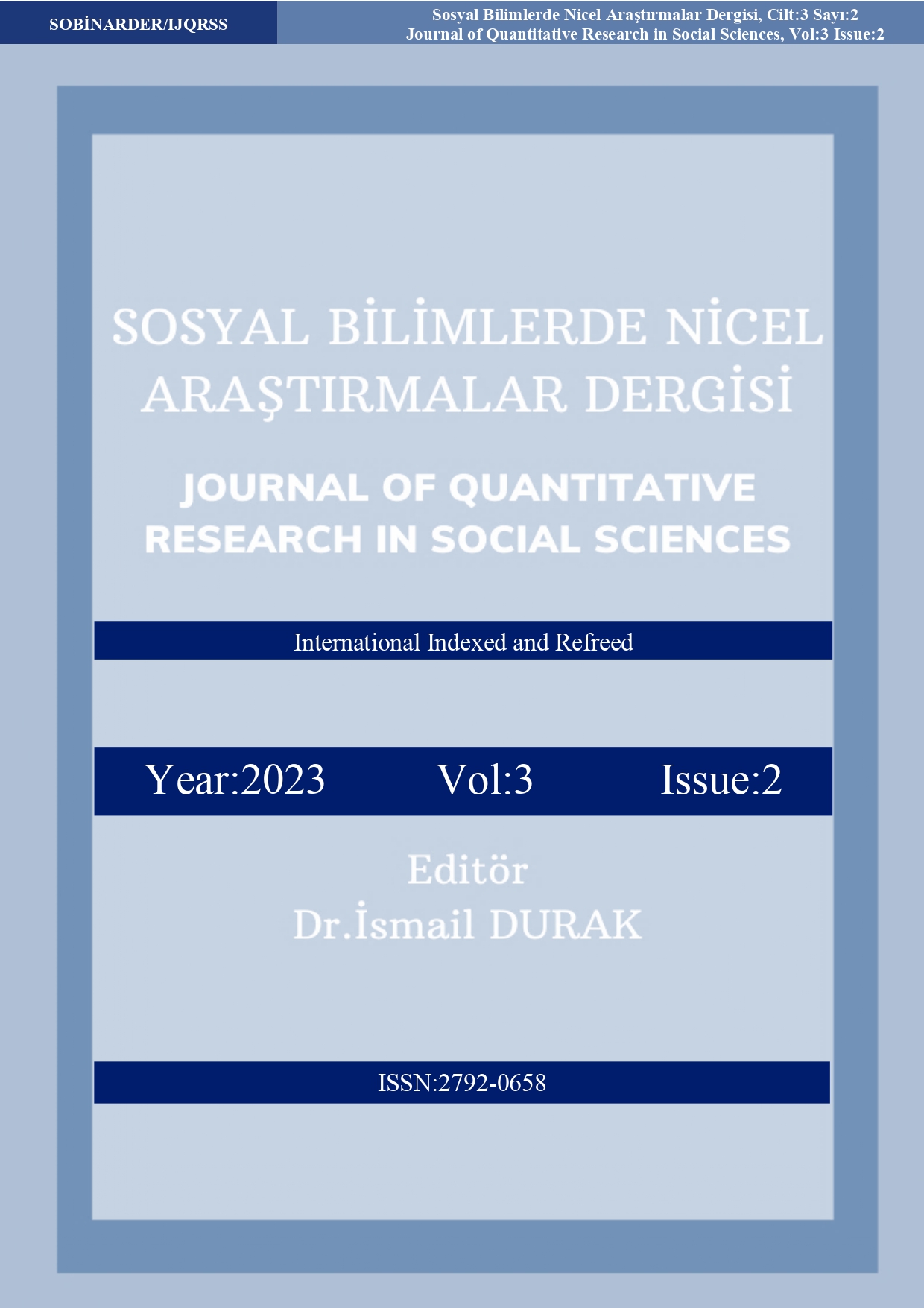Van İlinde Faaliyet Gösteren Muhasebe Meslek Mensuplarının E-Dönüşüm Sürecine Yönelik Görüş ve Beklentileri
Opinions and Expectations of Accounting Professionals Operating in City of Van in the E- Transformatıon Process
Anahtar Kelimeler:
E-Dönüşüm- e-fatura- e-uygulamalarÖzet
Bu çalışmanın amacı, Van ilinde faaliyet gösteren muhasebe meslek mensuplarının e- dönüşüm sürecine yönelik görüş ve beklentilerinin cinsiyet ve mesleki deneyim bakımından farklılık olup olmadığının ortaya konulmasıdır. Bu amaçla hazırlanan anket formları Van ilinde faaliyet gösteren 153 tane muhasebe meslek mensubuna yüz yüze uygulanmış ve anketlerden alınan veriler istatiksel analiz programı SPSS’e (Statistical Package for the Social Sciences) yüklenmiş, Mann-Whitney U ve Kruskal Wallis testileri uygulanarak analiz edilmiştir. Elde edilen test sonuçlarına göre, Muhasebe meslek mensuplarının e-dönüşüme yönelik bilgi düzeylerinin ölçülmesi açısından Manny Whitney U testi analiz sonuçlarında cinsiyet açısından kadın ve erkek muhasebe mensupları arasında anlamlı farklılık ortaya çıkmıştır. Mesleki deneyim açısından Kruskal Wallis testinden yararlanılmış ve mesleki deneyim açısından istatistiki olarak anlamlı farklılıklar gözlemlenmiştir. Ayrıca Muhasebe meslek mensuplarının e-dönüşümün faydalılığı hakkındaki görüşleri açısından Manny Whitney U testi analiz sonuçlarında cinsiyet açısından kadın ve erkek muhasebe mensupları arasında anlamlı farklılık tespit edilirken; Mesleki deneyim açısından Kruskal Wallis testinden yararlanılmış ve mesleki deneyim açısından istatistiki açıdan anlamlı farklılıklar bulunmuştur.
Referanslar
Al-Htaybat, K., von Alberti-Alhtaybat, L., & Alhatabat, Z. (2018). Educating digital natives for the future: accounting educators’ evaluation of the accounting curriculum. Accounting Education, 27(4), 333-357.
Arıkan, Y. (2015). E-Uygulamalar. web: http://archive. ismmmo. org. tr/docs. Yayınlar/kitaplar/e-uygulamalar. Pdf.
Bayraktar, C., & Yıldırım, M. (2017). E-Belge Sistemleri Üzerine Davranışsal Tutum ve Kullanım Niyetlerinin İncelenmesi: Karabük İli Muhasebe Meslek Mensupları Örneği. Muhasebe ve Finansman Dergisi, (75), 95-114.
Çıtak, F., & Baskan, T. D. Muhasebedeki Elektronik Gelişmelerin Muhasebe Meslek Etiğine Etkisi: Kırıkkale İlindeki Muhasebe Meslek Mensuplarının Bakış Açısı Üzerine Bir Araştırma. Muhasebe Bilim Dünyası Dergisi, 22, 249-270.
Doğan, U. (2012). 100 Soruda e-defter. Vergi Sorunları Dergisi Eki, 280, 1-73.
Durmuş, A. F., Kaya, H. (2019). Dijital Muhasebe Uygulamalarının Muhasebe Hileleri Ve Kayıt Dışılığı Önlemeye Etkisi, III. Uluslararası Ekonomi, Siyaset ve Yönetim Sempozyumu Bildiri Tam Metin Kitabı, s.363-381, 10-12 Ekim, Diyarbakır: Dicle Üniversitesi.
Elçin, R., Gerekan, B., & Usta, M. (2018). E-Fatura, E-Defter Ve E-Arşiv Uygulamalarına Geçiş Sürecinde Yaşanan Sorunlar: Serbest Muhasebeci Mali Müşavirler Üzerine Bir Araştırma. Mali Cozum Dergisi/Financial Analysis, (146).
Ekinci, F., & Burcu, İ. N. A. N. (2019). SWOT-AHP Bütünleşik Yöntemi İle E-Fatura Sisteminin Değerlendirilmesi: Bilecik İli Örneği. Maliye Araştırmaları Dergisi, 5(2), 193-209.
Ghaffar, A. M., Mokhtar, M. Z., Ismail, W. N. S. W., & Othman, M. R. (2019). Determinant of e-accounting (EA) adoption among Malaysian maritime SMES. International Journal of Engineering & Technology, 8(1.8), 102-105.
Gönen, S., & Solak, B. (2017). Maliye Bakanlığı E-Dönüşüm Sürecinin Muhasebe Meslek Mensupları Açısından Değerlendirilmesine İlişkin Bir Alan Araştırması. Muhasebe ve Finansman Dergisi, (76), 63-80.
Güney, A. (2014). Role of technology in accounting and e-accounting. Procedia-Social and Behavioral Sciences, 152, 852-855.
Güney, S., & Özyiğit, H. (2015). Muhasebedeki Verilerin Yönetimde Kullanilmasi ve Elektronik Muhasebe Verilerinin Yönetim Kararlarına Etkisi. Elektronik Sosyal Bilimler Dergisi, 14(53), 279-297.
Kara, M., & Yılmaz, A. B. (2017). Serbest Muhasebeci ve Mali Müşavirlerde E-Belge Kullanımı ve Uygulamaları. Yüzüncü Yıl Üniversitesi Sosyal Bilimler Enstitüsü Dergisi,(35), 253-268.
Karasioğlu, F. & Garip, O. (2019). E-Muhasebe uygulamaları kapsamında güncel sorunlar ve çözüm önerileri: Karaman’da bir araştırma. Selçuk Üniversitesi Sosyal Bilimler Meslek Yüksekokulu Dergisi, 22(2), 433-446.
Kurnaz, E., Tekbaş, İ., Bozdoğan, T., & Çetin, Ö. O. (2020). Dijitalleşmeyle Birlikte Muhasebe Eğitiminin Muhasebe Meslek Mensupları Açısından Değerlendirilmesi. Muhasebe Bilim Dünyası Dergisi, 22, 81-96.
Marinagi, C., Trivellas, P., Reklitis, P., & Skourlas, C. (2015, February). Adoption and use of e-invoicing in Greece. In AIP Conference Proceedings (Vol. 1644, No. 1, pp. 279-286). American Institute of Physics.
Sandberg, K. W., Wahlberg, O., & Pan, Y. (2009, July). Acceptance of e-invoicing in SMEs. In International Conference on Engineering Psychology and Cognitive Ergonomics (pp. 289-296). Springer, Berlin, Heidelberg.
Spoz, A. (2014). A look at e-invoices from enterprises’ and government’s perspective. Prace Naukowe Uniwersytetu Ekonomicznego we Wrocławiu, (365), 254-264.
Tanç, Ş. G., & Deniz, F. (2020). Muhasebe Meslek Mensuplarının Muhasebe Uygulamalarındaki E-Dönüşüm Sürecine İlişkin Görüş ve Beklentileri: Hatay İli Örneği. Selçuk Üniversitesi Sosyal Bilimler Meslek Yüksekokulu Dergisi, 23(2), 622-636.
Tuğay, O., & Güler, A. (2021). Elektronik Muhasebe Uygulamaları Konusunda Muhasebe Meslek Mensuplarının Görüşleri: Isparta İlinde Bir Araştırma. Muhasebe ve Vergi Uygulamaları Dergisi, 14(2), 695-726.
Ulusan, H., & Bozkurt, E. (2021). Yozgat’ta Faaliyet Gösteren Muhasebe Meslek Mensuplarının E-Fatura Ve E-Defter Uygulamalarına Karşı Tutumları. Muhasebe ve Vergi Uygulamaları Dergisi, 14(1), 1-44.
Yanık, R., & Karadaş, A. (2013). E-Faturanın Türkiye Muhasebe Standartları Uyum Sürecine Uygun Düzenlenmesine İlişkin Bir Öneri. Ekev Akademi Dergisi, 57(57), 133-142.
https://turmob.org.tr/e-donusum/efatura (29.12.2021)
https://www.edefter.gov.tr/sss.html (29.12.2021)
www.efatura.gov.tr (29.12.2021)
İndir
Yayınlanmış
Nasıl Atıf Yapılır
Sayı
Bölüm
Lisans
Telif Hakkı (c) 2024 Sosyal Bilimlerde Nicel Araştırmalar Dergisi

Bu çalışma Creative Commons Attribution-NonCommercial 4.0 International License ile lisanslanmıştır.
Telif hakkı hakkında










